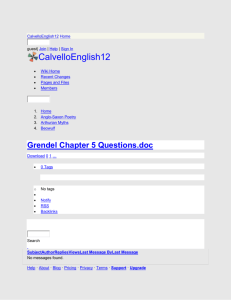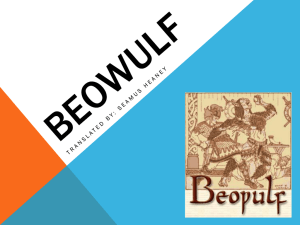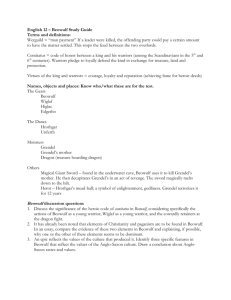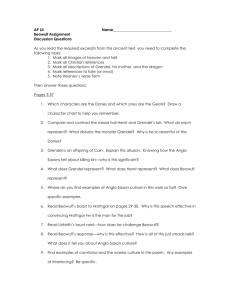Beowulf Study Questions: Comprehension & Analysis
advertisement
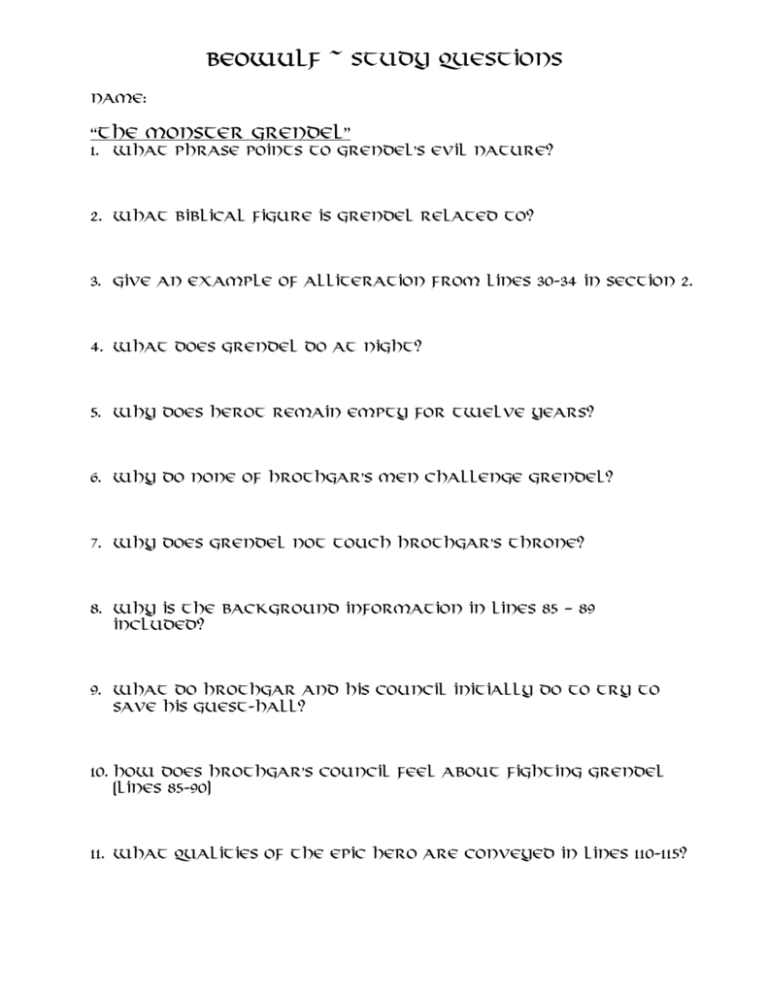
Beowulf ~ Study Questions Name: „The Monster Grendel‰ 1. What phrase points to GrendelÊs evil nature? 2. What biblical figure is Grendel related to? 3. Give an example of alliteration from lines 30-34 in section 2. 4. What does Grendel do at night? 5. Why does Herot remain empty for twelve years? 6. Why do none of HrothgarÊs men challenge Grendel? 7. Why does Grendel not touch HrothgarÊs throne? 8. Why is the background information in lines 85 – 89 included? 9. What do Hrothgar and his council initially do to try to save his guest-hall? 10. How does HrothgarÊs council feel about fighting Grendel (lines 85-90) 11. What qualities of the epic hero are conveyed in lines 110-115? Beowulf ~ Study Questions „The Arrival of the Hero‰ 1. How is Beowulf glorified in lines 125-130? 2. What proof does Beowulf offer that he is up to killing Grendel (lines 150-160)? 3. Why does Beowulf intend to fight Grendel without a sword? 4. What is the purpose of part IV of the poem? 5. How would you expect l. 190 to read and why? 6. What causes Hrothgar to make the speech·lines 191-209· reminding Beowulf of the time he helped BeowulfÊs father? 7. What is the probable effect of these words on Beowulf? 8. Define kenning. 9. Give an example of a kenning in line 218. Beowulf ~ Study Questions „UnferthÊs Challenge‰ 1. What does Unferth say to/about Beowulf? 2. How does Beowulf reply? 3. What is UnferthÊs motive for challenging Beowulf? 4. How does UnferthÊs challenge build suspense? 5. In what way does Beowulf compare his defeat of the sea monsters to a feast (sec.7)? 6. Read line 306. Do you think his words hold true for his time period only and not in our present day? Why or why not? 7. Define foil. 8. How is Unferth serve as a foil to Beowulf? 9. Define personification. 10. How is the coming of night personified in lines 379-380? 11. What does Hrothgar promise Beowulf (lines 388-391)? 12. Why does Hrothgar make this promise? Beowulf ~ Study Questions „The Battle with Grendel‰ 1. Why does Beowulf allow Grendel to kill one of the Geats before taking action himself? 2. Give an example of a kenning associated with Grendel. 3. In lines 475-478, how do the actions of BeowulfÊs men uphold the Anglo-Saxon code of honor? (Hint: loyalty to leader or loyalty to self?) 4. In this passage, what additional evidence do you find of the Christian-pagan tension in this epic? 5. Summarize what Beowulf does to Grendel. 6. Why does Beowulf hang GrendelÊs arm from the rafters of Herot (lines 515-517)? 7. What effect do you think seeing the arm would have on viewers? 8. How does GrendelÊs lake suggestive of hell? 9. What imagery in the description of GrendelÊs lair associates Grendel with death and darkness (lines 550-565)? 10. What challenge is Beowulf given in lines 564-569? Beowulf ~ Study Questions „The MonsterÊs Mother‰ 1. What characteristics of an epic hero does Beowulf display during his fight with GrendelÊs mother? 2. In lines 623-625, what saves Beowulf from being killed by GrendelÊs mother? 3. What is suggested by the following lines·628-632· 4. Make a prediction about the end of the battle between Beowulf and GrendelÊs mother. 5. Read lines 646-665. Is this an example of overkill? Beowulf ~ Study Questions „The Final Battle‰ 1. The odds are against Beowulf at this point. Why does he keep fighting? 2. To what extent has Beowulf remained an epic hero? 3. Why do you think BeowulfÊs men desert him now? 4. Why does Wiglaf decide to fight side by side with Beowulf? 5. What examples of alliteration do you find in lines 789-90? 6. Is Beowulf an epic hero to the end? 7. How do the Geats regard their dead king? Beowulf ~ Study Questions Name: Answer Key “The Monster Grendel” 1. What phrase points to Grendel’s evil nature? [“Down in the darkness—line 1 – 2—suggests an evil lower world. 2. What biblical figure is Grendel related to? [Cain—according to legend Cain fathered a brood of monsters] 3. Give an example of alliteration from lines 30-34 in section 2. [-sprawled in sleep, suspecting/nothing] 4. What does Grendel do at night? [He slaughters men sleeping at Herot] 5. Why does Herot remain empty for twelve years? [So Grendel ruled, fought with the righteous,/One against many, and won; so Herot/Stood empty for, and stayed deserted for years,/Twelve winters of grief for Hrothgar, king] 6. Why do none of Hrothgar’s men challenge Grendel? [They are afraid for their lives – II. 214—222 the men did make some ineffectual attempts.] 7. Why does Grendel not touch Hrothgar’s throne? [The throne is protected by God] 8. Why is the background information in lines 85 – 89 included? [Possibly because it shows how great is Hrothgar’s need for a hero—Beowulf] 9. What do Hrothgar and his council initially do to try to save his guest-hall? [They held councils, sacrificed to the old stone gods and made heathen vows.] 10. How does Hrothgar’s council feel about fighting Grendel (lines 85-90) [They are afraid and can not agree on any actions to attempt wondering what even “the bravest of warriors could do.”] 11. What qualities of the epic hero are conveyed in lines 110-115? [Beowulf is greater than anyone else in the world; he acts quickly to rescue the helpless] “The Arrival of the Hero” 1. How is Beowulf glorified in lines 125-130? [The king—Hrothgar—has hear of Beowulf and knows of his noble birth. The king recognizes the peril of Beowulf’s journey] 2. What proof does Beowulf offer that he is up to killing Grendel (lines 150-160)? [He has killed many enemies, chained five giants and chased their race from the earth, and hunted monsters from the ocean] 3. Why does Beowulf intend to fight Grendel without a sword? [Beowulf is concerned about Higlac’s—the king of the Geats—opinion of him. Since Grendel does not carry a weapon, Beowulf does not wish to have an unfair advantage. If the two engage in hand-to-hand combat, good is pitted against evil on a more elemental level.—Later it is revealed—ll. 480-485—that Grendel has put a spell on all weapons to render them useless.] Beowulf ~ Study Questions 4. What is the purpose of part IV of the poem? [The purpose may be to introduce the character of Beowulf, his proposed deeds, and the Anglo-Saxon concept of fate or wyrd. The purpose may also be to include some of the Geat’s history.] 5. How would you expect l. 190 to read and why? [Expected word order might be, “Hrothgar, protector of the Danes, replied.” This order places the appositive, “protector of the Danes,” next to the word it describes, “Hrothgar.”] 6. What causes Hrothgar to make the speech—lines 191-209—reminding Beowulf of the time he helped Beowulf’s father? [Hrothgar wants to explain how he, like Beowulf, was once in a position to restore peace to a troubled land. He may wish to point out that Beowulf is honoring his father’s debt to Hrothgar. He wants to show how much the Danes have suffered and are in need of rescue.] 7. What is the probable effect of these words on Beowulf? [Either they will increase his determination or they will have no effect because he already knows what it is he will/must do.] 8. Define kenning. [In Anglo-Saxon poetry, a metaphorical phrase or compound word used to name a person, place, thing, or event indirectly.] 9. Give an example of a kenning in line 218. [—mead-hall] “Unferth’s Challenge” 1. What does Unferth say to/about Beowulf? [Unferth accuses Beowulf of boasting.] 2. How does Beowulf reply? [With tales of his youth that foreshadow his courage in the coming conflict with Grendel.] 3. What is Unferth’s motive for challenging Beowulf? [Unferth is jealous of anyone with greater fame and glory. He is suspicious of the foreigner. He is placed here by the storyteller as a complication in the plot to cause Beowulf to retell some of his previous feats.] 4. How does Unferth’s challenge build suspense? [It raises the question in the reader’s mind about Beowulf’s ability to defeat Grendel.] 5. In what way does Beowulf compare his defeat of the sea monsters to a feast (sec.7)? [He serves them his sword for the feast, but they die at the bottom of the sea for eating the “food” he feeds them.] 6. Read line 306. Do you think his words hold true for his time period only and not in our present day? Why or why not? [YES—People can drive away death by taking steps to protect themselves, such as by wearing seatbelts and not smoking. Beowulf ~ Study Questions NO—Modern people do not have to fight for their lives as much as the Vikings/ Norse did; we let fate take its course.] 7. Define foil. [The series of related events that make up a story or drama—situation, exposition, conflict, complications, suspense, climax, resolution, denouement.] 8. How is Unferth serve as a foil to Beowulf? [Unferth is a spiteful, idle boaster who has committed the unpardonable sin of murdering his kinsmen. Beowulf, on the other hand, has earned glory by defending those more helpless than he.] 9. Define personification. [A kind of metaphor in which a nonhuman thing or quality is talked about as if it were human.] 10. How is the coming of night personified in lines 379-380? [Night is capable of covering the earth with a net; the “shapes of darkness” moving “black and silent” could be fish caught by the fisherman or people caught by night.] 11. What does Hrothgar promise Beowulf (lines 388-391)? [He gives him command of Herot and promises him treasures.] 12. Why does Hrothgar make this promise? [According to the code of comitatus, he is making a promise to reward Beowulf for his loyal service, thereby reaffirming his kingly dignity. Hrothgar is creating a contract, summarizing his own expectations and Beowulf’s intentions. The poet may have included these words to build up suspense in the listener/reader about the upcoming battle between Beowulf and Grendel.] “The Battle with Grendel” 1. Why does Beowulf allow Grendel to kill one of the Geats before taking action himself? [Perhaps Beowulf is taking time to formulate a plan of attack. Perhaps Grendel simply moves too quickly for Beowulf to stop him.] 2. Give an example of a kenning associated with Grendel. [-shepherd of evil; guardian of crime—both use prepositional phrases] 3. In lines 475-478, how do the actions of Beowulf’s men uphold the Anglo-Saxon code of honor? (Hint: loyalty to leader or loyalty to self?) [They are prepared to defend their lord with their lives.] 4. In this passage, what additional evidence do you find of the Christian-pagan tension in this epic? [Grendel is “sin-stained” but also capable of the power to “bewitch” and cast “spells,” suggestive of pagan rites. These lines also suggest Grendel is doomed to hell because he does not understand what it is to feud with God.] 5. Summarize what Beowulf does to Grendel. [Beowulf tears off Grendel’s arm and the monster retreats to his den.] Beowulf ~ Study Questions 6. Why does Beowulf hang Grendel’s arm from the rafters of Herot (lines 515-517)? [Beowulf shows his victory, like a trophy, just as some modern-day hunters hang antlers or stuffed heads on their walls. By displaying Grendel’s arm, Beowulf shows that Grendel is defeated and disarmed. Beowulf displays how awful his opponent was and, in so doing, calls attention to his own greatness.] 7. What effect do you think seeing the arm would have on viewers? [It would make them honor or stand in awe of Beowulf It would serve as a warning to other monsters and possible opponents.] 8. How does Grendel’s lake suggestive of hell? [There is powerful heat in the steaming and boiling waters. The swirling may suggest fires. It is called a “horrible” place and referred to as hell.] 9. What imagery in the description of Grendel’s lair associates Grendel with death and darkness (lines 550-565)? [Images of blackness—when the wind stirs the waves, the waves are dark and black as they splash toward the sky. The deer and stag prefer to die on the shore rather than attempt to save their lives by jumping into the lake, apparently associating the lake with death.] 10. What challenge is Beowulf given in lines 564-569? [The defeat of Grendel’s mother.] “The Monster’s Mother” 1. What characteristics of an epic hero does Beowulf display during his fight with Grendel’s mother? [Beowulf exhibits superhuman strength. Nothing stops him in his quest to defeat the powers of darkness. He stays focused on “fame,” which for him means triumph in a good cause.] 2. In lines 623-625, what saves Beowulf from being killed by Grendel’s mother? [Laying on the ground with his arms outstretched his prostrate form echoes the shape of the cross.] 3. What is suggested by the following lines—628-632— [The lines suggest a resurrection—Holy God sends the victory; Beowulf rises from his near-dead position to fight.] 4. Make a prediction about the end of the battle between Beowulf and Grendel’s mother. [Answers vary – Beowulf will win and cut off the arm of Grendel’s mother to hand in the mead-hall too or Beowulf will kill her but die in the effort.] 5. Read lines 646-665. Is this an example of overkill? [YES—Beowulf’s response to the situation is overdone. The storyteller was not satisfied with a single “kill” in this episode: Two monsters had to be killed, one of which was being killed over again. NO—the repeated deaths just heighten the drama.] Beowulf ~ Study Questions “The Final Battle” 1. The odds are against Beowulf at this point. Why does he keep fighting? [Beowulf has always done what needs to be done, regardless of the consequences; he remains the same dedicated, determined defender of good against evil. He cannot give up, no matter the cost or the odds.] 2. To what extent has Beowulf remained an epic hero? [He has not changed at all. He remains determined to face his enemy. As the leader of his people, it is his ethical responsibility to fight. Beowulf epitomizes the AngloSaxon code of honor to the very end.] 3. Why do you think Beowulf’s men desert him now? [Some critics see the failure of Beowulf’s men to come to his aid as an ominous forecast of the demise of the Anglo-Saxons, whose society was built around the code of the comitatus, in which a leader who rewarded his loyal followers with riches expected loyalty in return— They see that Beowulf cannot win. They are not epic heroes; they are not as brave as Beowulf; they are not consistently ethical or true to their sense of fate. They are only men while Beowulf, it seems, is something larger and greater.] 4. Why does Wiglaf decide to fight side by side with Beowulf? [He believes he owes the good life he has enjoyed to Beowulf. He also remembers swearing to repay Beowulf with his life, if need be.] 5. What examples of alliteration do you find in lines 789-90? [-butchered, by, beast; swore, swords] 6. Is Beowulf an epic hero to the end? [NO—Beowulf fails in his last attempt to slay the dragon. YES—Beowulf remains courageous until the end; his soul flies “to glory”; he has spent his life fighting evil and has displayed superhuman courage while doing so. He inspires Wiglaf’s courage and will be glorified by all who will benefit from the dragon’s death.] 7. How do the Geats regard their dead king? [They regard him as the greatest of heroes, the most noble of men. They praise his deeds. They agree that no better man ever lived and that none was “so deserving of praise.”]





